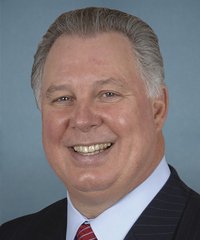
Born in the Cuban town of Bejucal, he grew up in the waning years of pre-Communist Cuba. His family fled in January 1962 with the help of relatives in America. Congressman Sires became a star basketball player at Memorial High School and received a four-year basketball scholarship from St. Peter’s College. He went on to receive a Masters Degree from Middlebury College in Vermont.
Congressman Sires was a teacher and business owner before entering public service. He proudly served as Mayor of West New York, New Jersey from 1995 to 2006. During that time, the Congressman created more affordable housing units than any municipality in the State of New Jersey by fostering public-private partnerships and the use of targeted tax incentives.
Scientific progress and technological innovation are critical to ensuring the future competitiveness of our country. This requires continued and reliable investment in scientific research and development, as well as in STEM education. This research has allowed disabled veterans to use artificial limbs to adjust back to everyday life, protected our firefighters with advances in turnout gear, and saved households money on energy bills through the use of alternative energy sources. These innovations, along with many more, have spurred economic growth, improved Americans’ daily lives, and demonstrated a return on investment that benefits our communities.
Space Exploration
While the 8th District may be over 1,000 miles from Cape Canaveral, the advancements and new technology resulting from National Aeronautics and Space Administration (NASA) projects have fundamentally changed the way people across the country live their lives. NASA’s aeronautics research helps maintain U.S. leadership in aviation, which is a key economic driver for the nation, and technology spinoffs based in space exploration can be found in our daily lives. Everyday items such as memory foam, scratch-resistant lenses, invisible braces, cell phone cameras, Dustbusters, and precision GPS are just a few of the technologies that can trace their origins in part back to NASA programs or collaborations.
Furthermore, NASA contractors employ suppliers throughout the United States, including New Jersey, to help build NASA’s Deep Space Exploration Systems supporting missions to the Moon, Mars, and beyond. In New Jersey, there are currently 120 suppliers that support NASA’s deep space exploration program. Additionally, NASA missions inspire the next generation of scientists to pursue careers in STEM. That is why I am a member of the NASA Caucus and support annual appropriations to NASA’s National Space Grant College and Fellowship Program (Space Grant), enabling students across the country to engage in outreach activities and research projects that prepare them for STEM careers. New Jersey’s Space Grant Consortium, led by Rutgers University, involves a total of 17 institutions which include the Liberty Science Center, New Jersey City University, the New Jersey Institute of Technology, and Stevens Institute of Technology.
Research and Development (R&D)
As a member of the R&D Caucus, I believe that sustained investment in scientific R&D is integral to the progress of our nation. In particular, robust funding for medical research enables the development of new treatments and cures for some of the most deadly diseases that affect our community. R&D funding supports jobs, innovation, and improves the overall health of our society, which in turn has the potential to increase productivity and reduce the costly burden of illness. For example, the National Institutes of Health (NIH) is the largest single public funder of biomedical research in the world, generating an estimated $68.8 billion in economic output nationwide in fiscal year (FY) 2017. For New Jersey in FY 2018, NIH supported $261.3 million in awards funding, 5,817 jobs, and $974 million in economic activity. I will continue to be an ardent supporter of investments in medical research, which is why each year I request robust funding for the NIH and its various institutes as part of the annual appropriations process.
STEM Education
In order to maintain our role as leaders in scientific progress and innovation, we must provide adequate resources to foster the next generation of scientists, educators, and engineers. According to the Pew Research Center, STEM employment has outpaced overall U.S. job growth, growing at a rate of 79% since 1990. The 8th District is home to some incredible universities that facilitate cutting-edge STEM learning and leadership. However, there is still much to be done to increase the diversity of the STEM workforce.
I regularly advocate for funding for the National Science Foundation (NSF), which accounts for about one-fourth of federal support to academic institutions for basic research. As a member of the STEM Education Caucus, I have cosponsored legislation that supports STEM education and scientific discovery including: